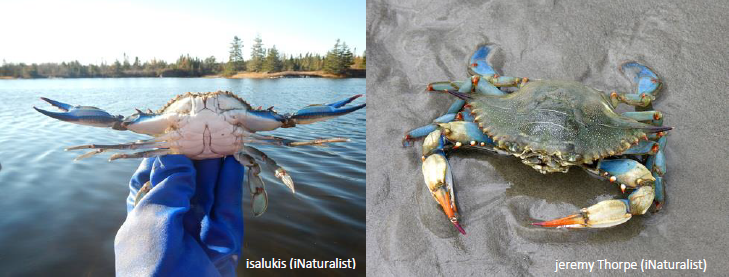Natural England would like help to better understand the current frequency of occurrences and improve recording of Atlantic Blue Crab
D&S IFCA is helping to highlight that invasive species can pose major threats to native biodiversity, economy, human health and ecosystem services. Atlantic Blue Crab (Callinectes sapidus) is a voracious predator of clams, mussels and oysters. It opens shellfish with its claws, by chipping the edge of a valve, or forcing the valves apart. Predation rates can be high on unprotected shellfish beds. This species is unlikely to be a threat to GB in our current climate, but it has the potential to establish in the future.

Recent Records
The Atlantic Blue Crab is native to the western Atlantic Ocean. It was introduced to Europe in the early 1900s and is now invasive in the Mediterranean. Other sightings have been made in France, Portugal, Spain and the North Sea.
It is not established in GB because our waters are unlikely to be suitable for its survival. However, there have been a handful of sightings dating back to 1979 and recently, in July 2024, a dead specimen was found by a member of the public near Brighton marina.
Likely pathways of introduction are through transport in ballast water as well as natural dispersal (females can travel several hundred kilometres). It is sold live in the UK so there could also be accidental/deliberate releases.
Why Natural England Need Your Help
Natural England are keen to better understand the current frequency of occurrences and improve recording of this species. Please be vigilant and send reports, ideally with photos, through the iRecord reporting platform: iRecord.
Biosecurity:
Promote and practice best practice biosecurity to prevent this and other INNS from being introduced and spread https://www.nonnativespecies.org/biosecurity/marine-biosecurity/
More Information
For more information:https://www.cabidigitallibrary.org/doi/full/10.1079/cabicompendium.90126
Contact:
marineinvasivespecies@naturalengland.org.uk

